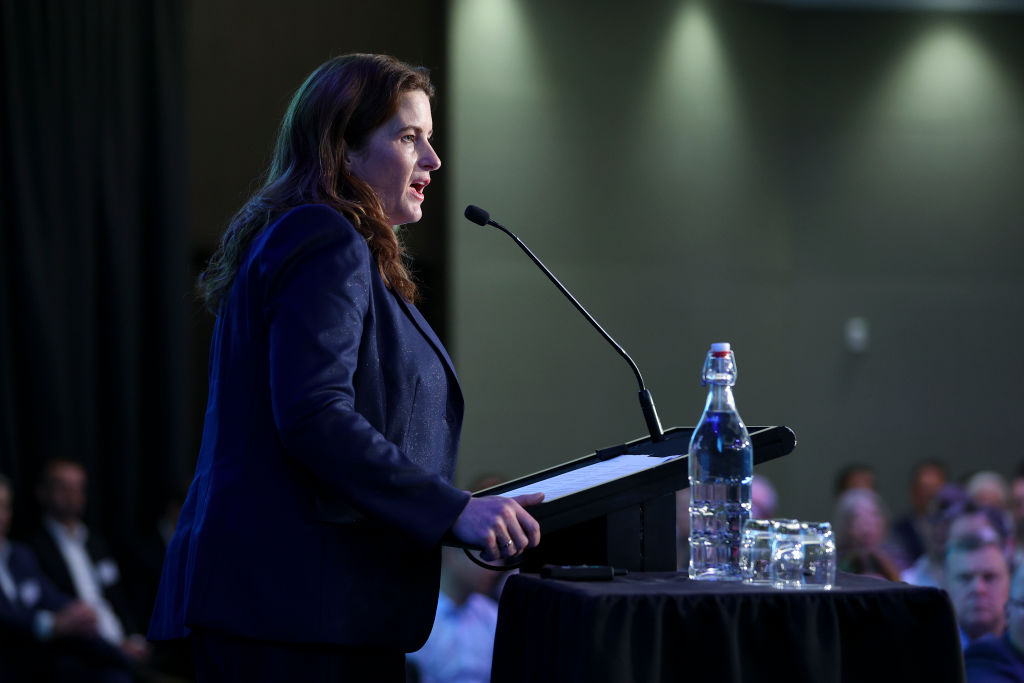Nicola Willis has highlighted five issues that the government sees as crucial to New Zealand’s future.
New Zealand’s Finance Minister Nicola Willis has opened a two-day national economics forum with a speech announcing an 80-point “Going for Growth” plan to address five key issues the government sees as crucial to growing the economy.
Willis said it was time for New Zealand to put its own interests at the forefront.
“Leaders around the world are being compelled to act more boldly than they have for several decades,” she said.
“Where once countries could take for granted their position in the world, it is now unquestionable that we need to place ourselves in the driver’s seat for our national interests.”
The centrepiece of her 3,000-word speech was an announcement that the government would work with prospective new entrants to the grocery retail sector, perhaps assisting them in obtaining suitable land or meeting the requirements of the Overseas Investment Act.
“Over the past 12 months, international supermarket chains and local investors have expressed interest in entering the New Zealand grocery market,” she said.
“I want to help them succeed.”
It appears the government has decided to encourage competition rather than forcefully break the hold of Woolworths and Foodstuff—which together have 82 percent of the market—by ordering them to divest, as consumer groups have long advocated for.
Other focus areas are developing talent through education and skills enhancement, making business settings more competitive, promoting global trade and investment, modernising the country’s science and innovation system, and removing roadblocks to housing and infrastructure delivery.
Those aims will be achieved through three areas of reform: increased capital investment by firms, supported by higher domestic savings and inbound overseas investment; secure, affordable, and abundant electricity supply; and tax and regulatory settings that support greater competition in key sectors, including banking, grocery, and energy.
Many specifics have yet to be provided, as the Coalition enters its second year of a three-year term.Willis said the government was addressing each focus area by “improving our education system” for Kiwi kids, “removing red tape, reducing compliance costs and promoting competition” for Kiwi consumers, “growing our trade relationships and rolling out the welcome mat for international investment so we can deliver better-paying jobs for Kiwis,” and so on.
Further details about how these aims will be achieved have yet to be disclosed.
Willis did, however, reveal that she is soon to take recommendations to Cabinet which would ensure “value to New Zealand” is properly considered when government agencies are choosing suppliers. They will required to take into account “the contribution particular contracts can make to New Zealand as a whole.”
“Small- and medium-sized businesses say that too often they can’t effectively bid for government contracts because of the complexity of official procurement processes,” Willis said.
“I want to ensure value to New Zealand is properly considered when government agencies are picking suppliers, ensuring a more level playing field, improving the ability of smaller businesses to bid and giving more small- and medium-sized Kiwi businesses the opportunity to grow and become global players.”
On tax, she said she was considering a range of proposals to make New Zealand’s tax settings more competitive.
“We need to ensure the New Zealand tax system does not discourage businesspeople from investing in their businesses and does not deter foreign investment,” she said.
On energy, Willis said the world’s “surging demand” for renewables had “changed the game.”
“It’s time to think much more boldly about the actions the government may need to take to incentivise new generation, security of supply, and affordable electricity. The question is, are we well positioned to bring on new generation at the pace needed to keep both security of supply and affordability?
“That’s a question the government is very much engaged in.”
She pointed out that the Energy Competition Task Force has published proposals to give consumers more control over energy costs, and independent reviewers are due to report on the energy market’s performance in mid-year.
While stating she wanted to see the balance of Kiwisaver (New Zealand’s national superannuation scheme) grow, Willis said she was “taking advice on options for achieving that with a view to making recommendations to Cabinet.”
“Commerce Minister Andrew Bayly already has work underway to enable Kiwisaver providers to make greater investments in private assets, to generate good returns for savers, and ensure more Kiwi savings can be deployed for investment here at home,” she said.
A 1News Verian poll earlier this week found half of all New Zealanders are not confident Willis will deliver good economic growth over the term of this government, while 34 percent of people are confident and 17 percent didn’t know or didn’t want to say. The poll of 1,002 eligible voters was conducted from Feb. 3 to 7.

